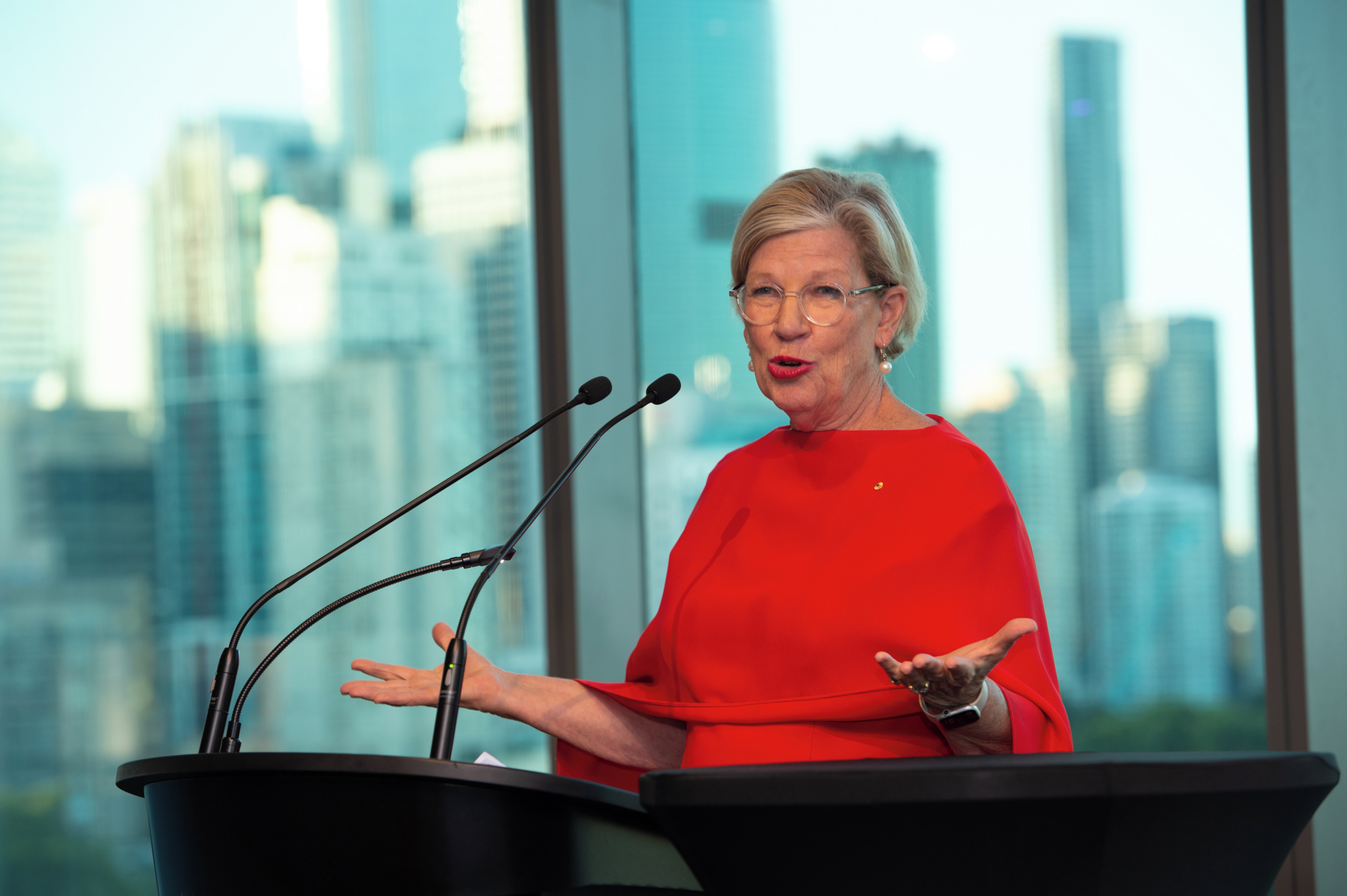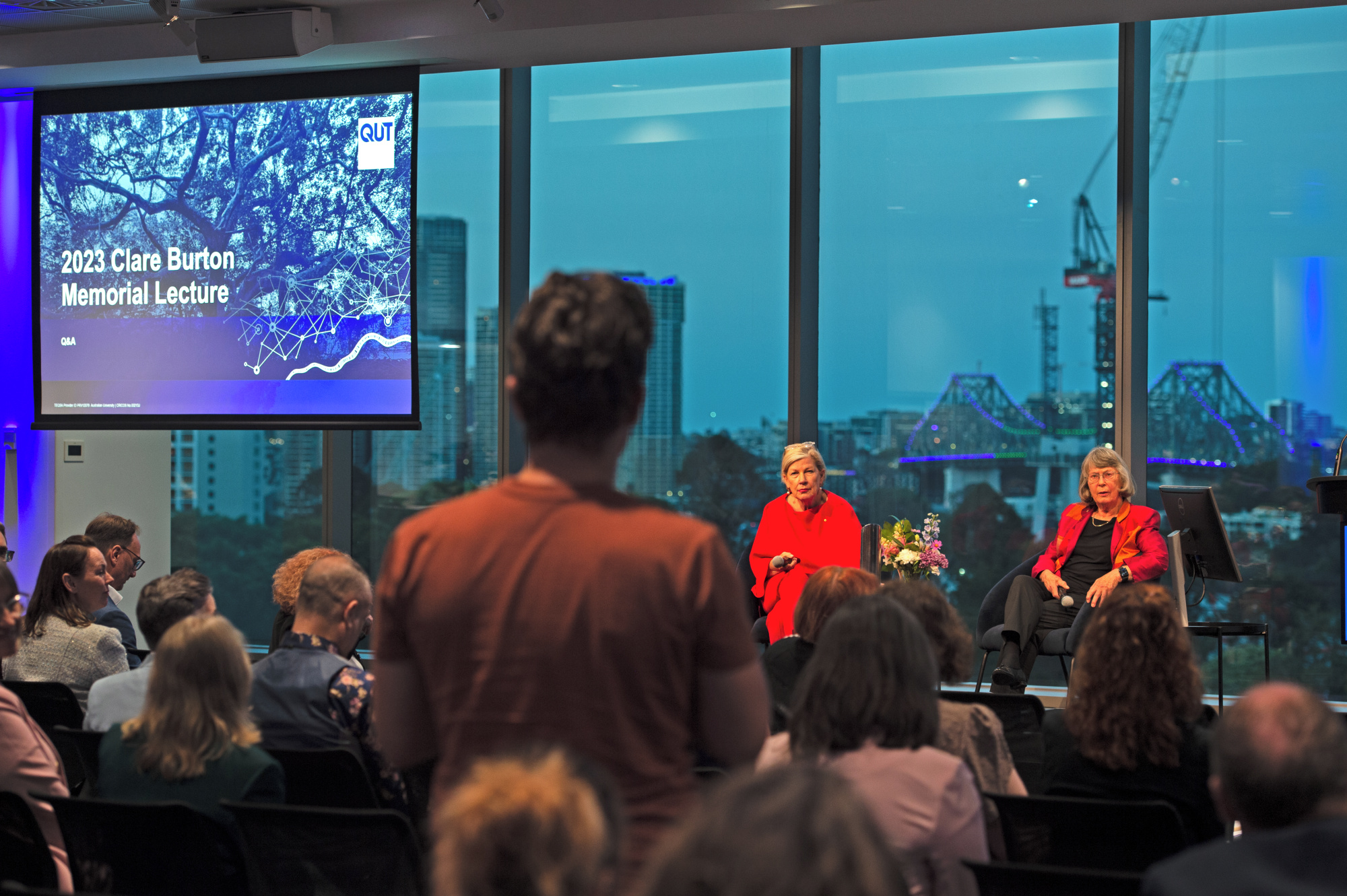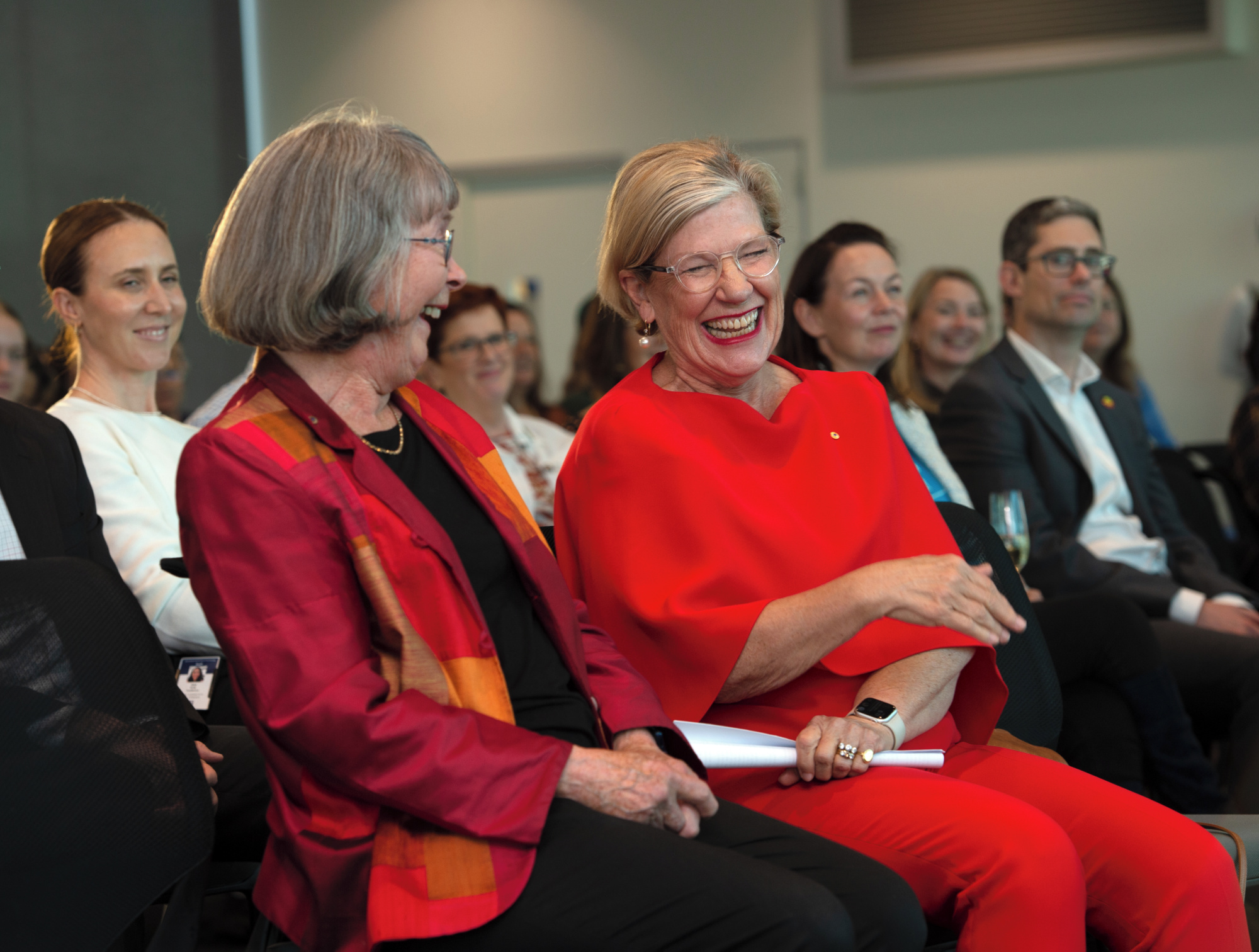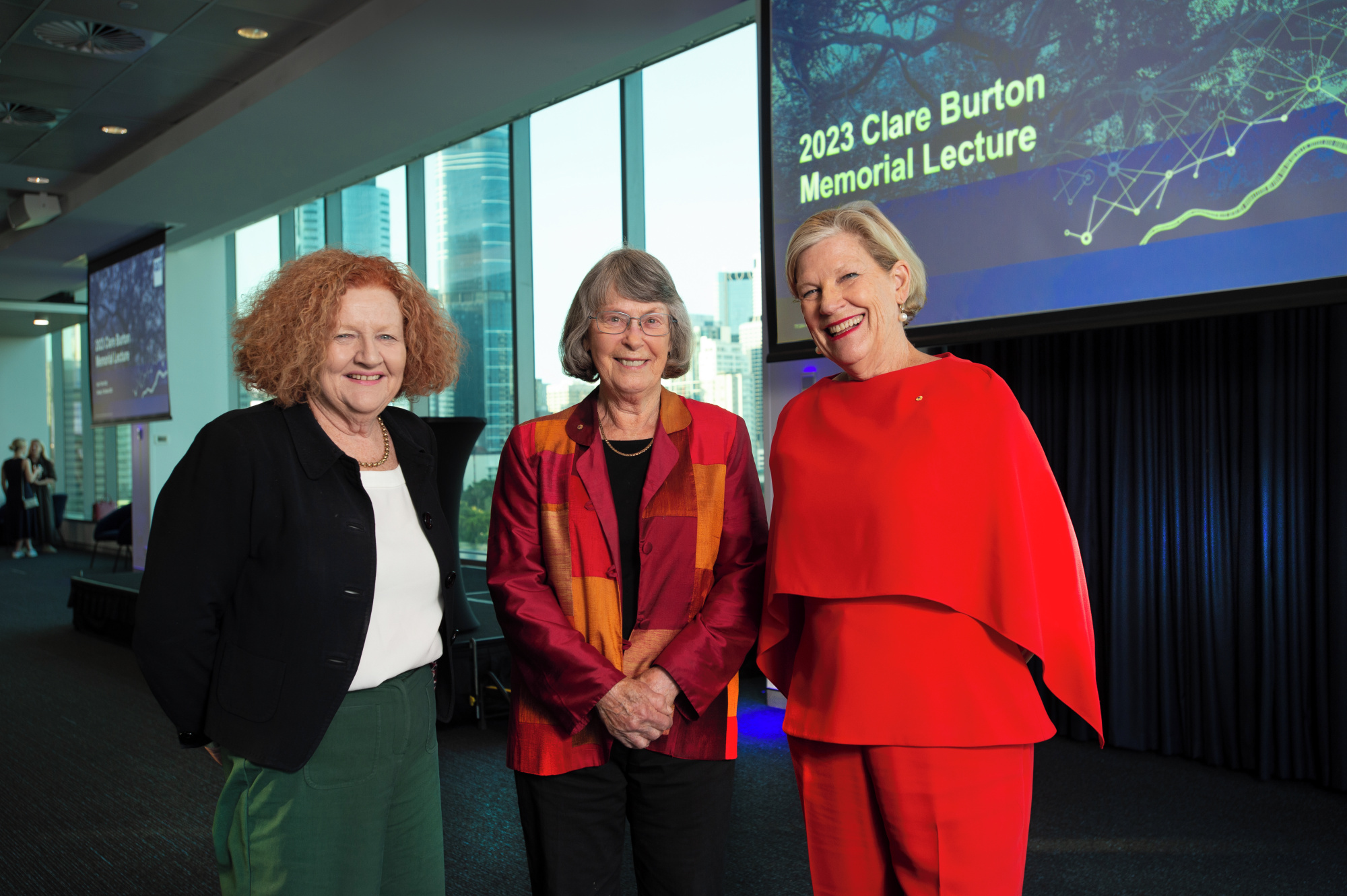Men and women must accelerate the push toward gender parity which at its current pace will take more than 100 years to achieve, the 2023 Clare Burton Memorial Lecture has heard.
Students and senior staff joined QUT Chancellor Ann Sherry AO and Dr Clare Burton’s sister, Professor Meredith Edwards for the second Clare Burton Memorial Lecture, in honour of the significant contribution to gender equity and organisational change made by Dr Burton before her untimely death at the age of 55 in 1998.
“This isn’t a fight for women it’s a fight for all of us,” Ms Sherry said. “We need women and men standing shoulder to shoulder. We need men in power to share power. We need men in power to call out when they see things that are wrong, that enhance their opportunities at the expense of others and particularly of other women.

“And even though a lot of the work (Clare) did was on gender, it wasn’t anchored just in gender, it was anchored in capability. We want to reflect and respect people’s capability in workplaces, and I think we have a lot more work to do on that.”
She said Australians should be impatient for change as no country in the world had reached gender parity yet and at the current rate of improvement it would take more than 100 years to get there.
University of Canberra Emeritus Professor Meredith Edwards remembered her sister in a moving tribute and joined Ms Sherry in a wide-ranging discussion with students and senior leaders.

“You think you’re making progress but you can go backwards,” Professor Edwards said when asked about the impact of culture in Australia’s slow-moving gender equity race.
“You need to get inside the frame of those who are not coming with you. You won’t get them all. But what is the fear they have? What is stopping them coming with you? Understand that position and try to frame the arguments that way.”
Proximity bias was called out in a discussion on the impact of flexible working arrangements in a post-Ccovid environment.
“As people come back into workplaces, my observation is men are coming back faster than women because of a weird combination of identity and valuing the workplace dynamic differently to women,” Ms Sherry said.
“Most companies are tracking promotion decisions now that people have been back a year, to make sure that proximity bias does not influence promotion decisions and I think that everyone is seeing that it is.
“If you spend more time in the office with the team, you are more likely to get the next job than someone who spends less time in the office. So we don’t want to embed just a different form of disadvantage as a result of this flexibility.”
Poor hiring practices brought about by the outsourcing of recruitment were mentioned in relation to the myth of merit for people with disabilities, LGBTIQ communities, First Nations people and people of colour.
Ms Sherry said organisations will come under greater pressure to publish data around their performance on the hiring of people.
“Universities aren’t guilty of this but other corporate organisations have outsourced their hiring, letting the team down.
“Turnover is high because the hiring is so poor. If our hiring was from much more diverse communities – and many of the communities you talk about are really keen for jobs – they are much better employees in those jobs than the traditional groups we’ve hired that are just passing through.”
Professor Edwards challenged university researchers to shine a light on the federal government’s soon-to-be-released report into the care and support economy, as those feminised caring professions continue to struggle for better working conditions despite being highly valued during the pandemic.
“This is a very good opportunity to take that report when it comes out and put a light on what’s important,” Professor Edwards said.
“On the one hand it will be really positive on the value of care, it might even go on to say it should be in the indicators of the gross national welfare.
“On the other hand it is going to try to save money because the growth in expenditure is in the care industry … so watch that and make a comment on it. Become an expert in the area if you can.
“Looking at the care industry as a whole is not something researchers tend to do, it’s a void and we need people in that space.”
Australia’s passive reaction to government spending in some areas as opposed to others was also called out in relation to the care industry.
“Nobody bats an eyelid if it’s announced there’s $2 billion on some broke down bit of army kit that’s about to be bought again … (but) $2 billion to fix care and there’s chaos in the system,” Ms Sherry said.
“And this is not going against defence spending if it’s targeted. We are really uncritical of some pieces of what goes on in our economy and we are really honed-in and critical on others. And that’s where care is getting jammed.”
The QUT Clare Burton Lecture also coincided with global news that the Nobel Memorial Prize in Economic Sciences had been awarded to trailblazing researcher Professor Claudia Goldin for her work on the gender pay gap.
“I was absolutely ecstatic when I saw that in the paper today,” Professor Edwards said.

“We have fewer women doing economics … fewer women than in the STEM subjects. We should treat it as a STEM subject. We should do something about it.
“We don’t have enough women doing economics and it’s a fantastic discipline which enables you to go in many other directions.”

This was the second Clare Burton Memorial Lecture hosted by QUT which manages the Clare Burton Memorial Fund and Scholarship.
There have been 12 national recipients of the Clare Burton Memorial Scholarship since 2002 with Laura Good from the University of Sydney receiving the $10,000 award this year for her focus on gender equality in working life.
QUT Associate Professor Phoebe Hart was awarded the scholarship in 2006.
In thanking everyone for attending the event, QUT Vice-Chancellor Professor Margaret Sheil AO said students who were keen to do research into gender equity should apply for the scholarship next year.
Top image: QUT Chancellor Ann Sherry AO and Professor Meredith Edwards AM take questions from the audience at the 2023 Clare Burton Memorial Lecture. Pictures: Anthony Weate







